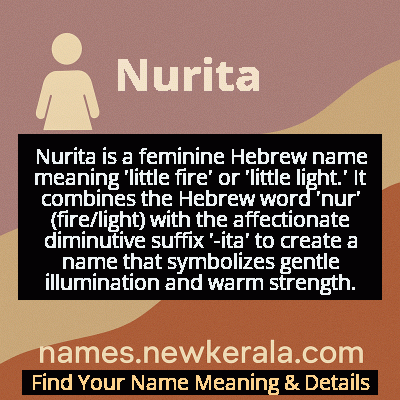Nurita Name Meaning & Details
Origin, Popularity, Numerology Analysis & Name Meaning of Nurita
Discover the origin, meaning, and cultural significance of the name NURITA. Delve into its historical roots and explore the lasting impact it has had on communities and traditions.
Name
Nurita
Gender
Female
Origin
Hebrew
Lucky Number
2
Meaning of the Name - Nurita
Nurita is a feminine Hebrew name meaning 'little fire' or 'little light.' It combines the Hebrew word 'nur' (fire/light) with the affectionate diminutive suffix '-ita' to create a name that symbolizes gentle illumination and warm strength.
Nurita - Complete Numerology Analysis
Your Numerology Number
Based on Pythagorean Numerology System
Ruling Planet
Moon
Positive Nature
Diplomatic, friendly, artistic, empathetic.
Negative Traits
Over-sensitive, moody, indecisive, prone to self-pity.
Lucky Colours
Green, cream, white.
Lucky Days
Monday.
Lucky Stones
Pearl, moonstone.
Harmony Numbers
1, 3, 4.
Best Suited Professions
Diplomats, mediators, caregivers, artists.
What People Like About You
Cooperative spirit, friendliness, artistic talent.
Famous People Named Nurita
Nurit Hirsch
Composer and Conductor
One of Israel's most prominent composers, known for her work in Israeli music and Eurovision Song Contest entries
Nurit Peled-Elhanan
Academic and Peace Activist
Israeli linguist and human rights activist, recipient of the Sakharov Prize for Freedom of Thought
Nurit David
Actress
Prominent Israeli theater and television actress, known for her versatile roles in Israeli drama
Nurit Kedar
Documentary Filmmaker
Award-winning Israeli documentary filmmaker focusing on social and political issues
Name Variations & International Equivalents
Click on blue names to explore their detailed meanings. Gray names with will be available soon.
Cultural & Historical Significance
Throughout Israeli history, the name Nurit/Nurita became popular during the early statehood period, reflecting the Zionist ideal of creating new Hebrew names that connected to the land and ancient traditions while embracing modernity. The name appears in Israeli literature and poetry, often used to represent the 'sabra' generation - native-born Israelis known for their toughness and resilience, yet with a sweet interior. In contemporary Israeli society, Nurita maintains its popularity as a name that honors Jewish heritage while feeling fresh and feminine, serving as a bridge between generations and cultural identities.
Extended Personality Analysis
Individuals named Nurita are often perceived as possessing a unique blend of warmth and strength, reflecting the name's meaning of 'little fire.' They typically exhibit intellectual curiosity, creativity, and a natural inclination toward leadership roles. Nuritas are known for their passionate nature - they approach life with intensity and conviction, yet maintain a gentle, compassionate demeanor that draws people to them. Their fiery spirit is balanced by emotional intelligence and empathy, making them excellent communicators and mediators.
Many Nuritas demonstrate artistic talents or strong academic inclinations, with a particular affinity for languages, literature, and cultural studies. They tend to be independent thinkers who value authenticity and are not afraid to challenge conventional wisdom when their principles are at stake. In relationships, Nuritas are loyal and protective, often serving as the emotional anchor for their loved ones while maintaining their own strong sense of identity. Their combination of intellectual depth and emotional warmth makes them memorable individuals who leave lasting impressions on those they encounter.
Modern Usage & Popularity
In contemporary times, Nurita remains a popular name in Israel and among Jewish communities worldwide, though its usage has evolved. While it peaked in popularity during the 1960s-1980s in Israel, it continues to be chosen by parents seeking a name that balances traditional Hebrew roots with a modern, feminine sound. The name has seen some international adoption, particularly in Spanish-speaking countries where the '-ita' suffix feels natural and affectionate. In recent years, there's been a slight resurgence of interest in the name among younger parents who appreciate its meaningful etymology and connection to Israeli heritage. The name maintains moderate popularity rankings in Israel, typically appearing in the top 200-300 names for girls, and serves as a cultural identifier in diaspora communities while remaining accessible to non-Hebrew speakers.
Symbolic & Spiritual Meanings
Symbolically, Nurita represents the concept of 'enlightened femininity' - the idea that strength and illumination can coexist with gentleness and nurturing qualities. The fire/light symbolism connects to multiple layers of meaning: intellectual enlightenment, spiritual guidance, emotional warmth, and creative inspiration. In metaphorical terms, Nurita embodies the 'eternal flame' that provides light without being consumed, suggesting endurance, consistency, and reliable presence. The name also carries botanical symbolism through its similarity to flowering plants, representing growth, beauty, and natural cycles. In psychological terms, Nurita symbolizes the integration of opposing forces - the intense heat of fire with the softness implied by the diminutive suffix, creating a balanced personality that can be both powerful and compassionate.

